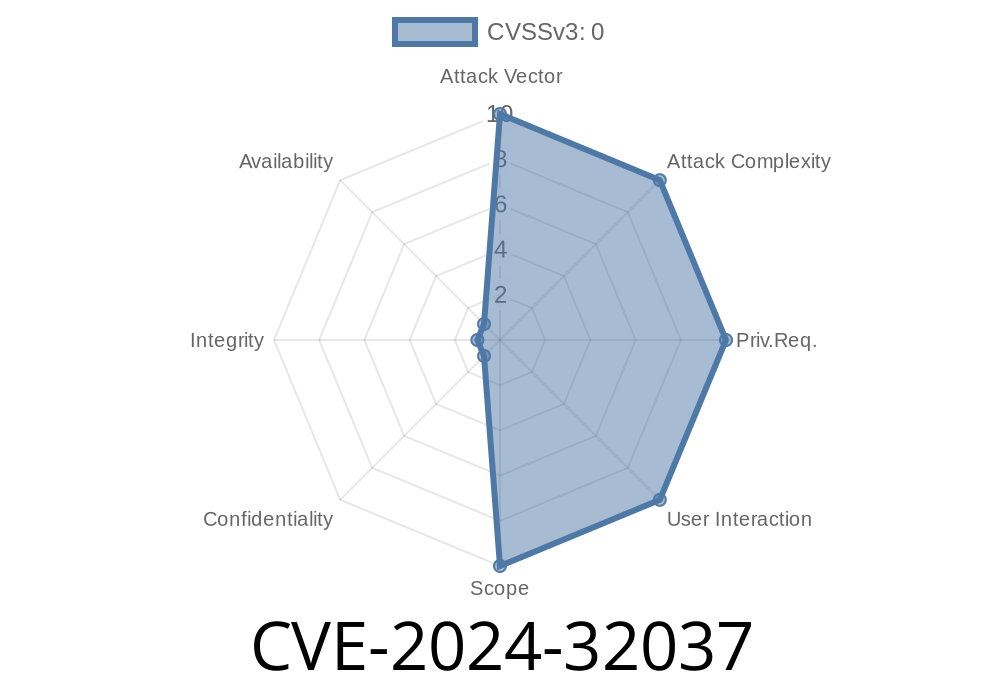If your team works with geographic or spatial data, you might use GeoNetwork. It’s a widely-used catalog application for managing "spatially referenced resources." In June 2024, a security vulnerability was made public: CVE-2024-32037. This post explains what happened, who is at risk, and how someone might exploit it—using simple real-world language and code examples.
What is GeoNetwork?
GeoNetwork lets organizations manage and search for geographic information—like maps, datasets, or geodata services. It’s popular for making spatial data “discoverable” over the web.
What is CVE-2024-32037?
For versions before 4.2.10 and 4.4.5, GeoNetwork’s search endpoint (/geonetwork/srv/eng/q) leaks information about the Elasticsearch database it uses, directly in the HTTP response headers.
Why does this matter?
Attackers can fingerprint your server, learning exactly what version of Elasticsearch you're running. This knowledge makes it easier for hackers to target vulnerable Elasticsearch versions, making any existing bugs or exploits more dangerous.
Here’s the official CVE entry:
CVE-2024-32037 on NVD (NIST)
GeoNetwork Security Advisory:
https://github.com/geonetwork/core-geonetwork/security/advisories/GHSA-vh88-9798-jxh3
How is the Information Disclosed?
The problem is with HTTP response headers in GeoNetwork’s search endpoints. When users interact with the search API, GeoNetwork passes headers from Elasticsearch, including version and product info, back to users.
Example response headers (vulnerable GeoNetwork)
HTTP/1.1 200 OK
Date: Tue, 04 Jun 2024 12:43:21 GMT
Content-Type: application/json
server: Elasticsearch/7.10.2 (Linux; x86_64; JVM)
x-elastic-product: Elasticsearch
...
The server and x-elastic-product headers help attackers identify what backend search engine you run and its version.
Proof-of-Concept: Testing for the Leak
Here’s a quick way you (or an attacker) can test if your GeoNetwork is leaking Elasticsearch details.
Using curl
curl -I 'http://your-geonetwork.example.com/geonetwork/srv/eng/q?any=data';
Look for lines like
server: Elasticsearch/7.10.2 (Linux; x86_64; JVM)
x-elastic-product: Elasticsearch
If you see these, your system is exposing backend info!
Exploit Scenario
While there’s no “remote code execution” or immediate direct hack here, this info is security-critical:
Targeted Attack:
They look up public Elastic CVEs (like CVE-2021-44228 a.k.a Log4Shell) to see if they apply.
Exploit Vulnerable Elasticsearch:
If your Elasticsearch version has known vulnerabilities, the attacker can exploit those—leading to data theft, remote code execution, or server takeover!
No Known Workarounds
Unfortunately, you can’t just change a config setting or use a reverse proxy to strip headers. The only way to fully fix CVE-2024-32037 is to upgrade GeoNetwork.
4.4.5
Get them from the GeoNetwork releases page.
Don’t expose GeoNetwork search endpoints to untrusted networks.
- Monitor logs for suspicious scans on /geonetwork/srv/eng/q.
References & Further Reading
- GeoNetwork Advisory: GHSA-vh88-9798-jxh3
- CVE-2024-32037 at NVD
- GeoNetwork OpenSource project
- Elasticsearch security docs
Summary
CVE-2024-32037 is an information leak in GeoNetwork before 4.2.10 or 4.4.5. The search endpoint exposes Elasticsearch version and product info via HTTP headers, enabling easier targeting by attackers. Patch your GeoNetwork to stay secure!
*If you found this post helpful, feel free to share or bookmark for your team.*
Timeline
Published on: 02/11/2025 22:15:27 UTC
